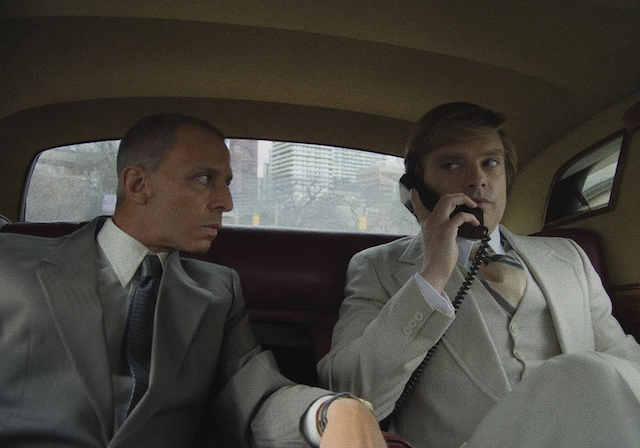
@Courtesy of Briarcliff Entertainment
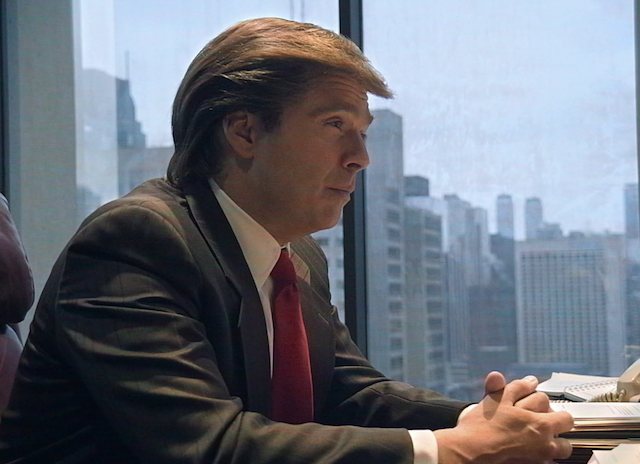
@Courtesy of Briarcliff Entertainment
Press Conference with Actors Sebastian Stan, Jeremy Strong, Maria Bakalova, Director Ali Abbasi & Screenwriter Gabriel Sherman
Q: Can you give a little bit of background about your own career and history covering Donald Trump?
Gabriel Sherman: Before my time working as a screenwriter I was and still am a journalist. I’ve written a lot about the American conservative movement, I’ve been writing about Donald Trump on and off since the early 2000s. He’s loomed large in my mind, I had covered his 2016 presidential campaign for New York Magazine.
I was struck during the campaign by things that people who had worked with Trump said, a variation of things like: “He sounds a lot like Roy Cohn used to” or “He’s using the lessons that Roy taught him” When I read about the dissolution of their relationship, how Roy felt betrayed when Donald distanced himself from him when Roy got sick with AIDS, I thought there was enough for a Shakespearean arc of this mentor/protege relationship. That was the genesis of how I thought this one relationship would explain so much of how we got to where we are today.
Q: Can you just share about where you’re from and why that may offer a different perspective than most of Gabriel’s screenplay?
Ali Abbasi: I’m not from America, I think it’s relevant. But I’m not sure if I think I find nationalities necessarily relevant when making movies. I like to explore universes with moral complexities, with flawed characters. I think that maybe that was my biggest interest in the project. Growing up in Iran, some of the stuff I saw in the American power system, especially on the right side of the spectrum, reminds me of the Islamic Republic where I grew up, the way to find creative interests in which your petty personal interests are connected to the bigger ideological picture.
If someone gave you a tax credit you’re the patriot, or that person is a patriot. If they didn’t give you the tax credit, they’re the enemy of the people or the communists. That’s why for me this story became so interesting, it’s the intersection of those moral complexities, the emotional richness of the mentor protege, the love story with that petty personal interest and the power structure together. It was a great lens to see the American empire through.
Q: What was the appeal of taking on the challenge of playing this guy who many people have their impersonations or versions of?
Sebastian Stan: This was an opportunity to actually go in and try to understand, educate myself and hopefully learn about this person, how he became what he is. Not just the ugly parts but also, as uncomfortable as it might be, try to understand what makes him so appealing that he can get the popular vote in 2024.
The film has aspects that are uncomfortable for people, but it’s more relevant now than ever, to go back and really understand what it is about this person that drives them. Taking the actor’s job, which is to put your judgment aside and try to look at the thing as objectively as possible. There is something in the American system where somebody like this can become what we’re seeing.
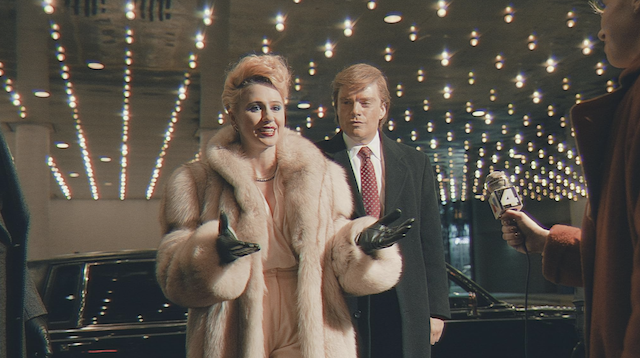
@Courtesy of Briarcliff Entertainment
Q: What did you bring to the character of Roy Kohn and what else were you able to learn from the script?
Jeremy Strong: I came to this project with a very basic understanding of Roy Cohn. I had seen of course Tony Kushner’s Angels in America, both on stage and Mike Nichols’ film. Al Pacino’s performance of him is really towering, a daunting thing to step into an arena with. I felt the highest degree of challenge was getting inside the skin of this person who was considered one of the worst human beings of the 20th century. Some people considered Roy this absolutely irredeemable, reprehensible abomination of humanity. He was also in his time beloved by many and was undeniably a brilliant lawyer.
Today we make movies about heroes and villains, we polarize everything. I’m very interested in not doing that and interrogating characters with a humanistic lens, understanding the toxic cocktail that forms someone like Roy, who was driven by a destructive nihilism. And also a need for acceptance and love, which gets misfired in all terrible ways. My hope is to inhabit a character as fully and dimensionally as possible. In this case it feels like you’re peering into the heart of darkness. It was creatively, morally, spiritually, a really difficult and gratifying thing to do.
Q: How did you wrap your head around Ivana’s motivations and get to the truth of who this woman was?
Maria Bakalova: I find a lot of things that I recognize in myself, like growing up in Czechoslovakia and growing up in Bulgaria, it’s not a big difference. Having the desire, having a dream. In her case, it wasr sports. In my case, that was through music in the beginning. Finding a way to escape the regime. I do find a lot of similarities between her approach to life and mine. The fact that if you want to achieve, you have to work hard. I also see that she’s been smart, she knew that she wanted to find somebody that was American, somebody that she established a life with, somebody that would be at least as good as her. Not being a trophy wife, but there’s been a bit of materialism in it.
It’s been interesting to experience some couples that are equally ambitious. I do believe that there had been some real attraction and passion that unfortunately throughout the years faded away. She’s been an example of women that can go through anything, strong and powerful and independent women. That’s been a rocky time, a horrible time, it’s devastating to feel like somebody doesn’t love you, a person that you build your life with doesn’t love you. It’s strange when you see Ivana and Roy, two very outspoken enemies from the beginning, feeling like they’re reconnecting in the face of seeing how the person they loved transitioned into someone else. It’s not verbally explained, just throughout a couple of looks that they have between each other. I’m so happy that Gabriel created that little scene.
Q: Now that Mr. Trump is President-Elect, how do you think the film will affect people who see it now?
Jeremy Strong: I think the film becomes more essential than before for people to see. It offers a great deal of insight into what happened and how we got to where we are today. The past is a prologue, there’s a lot to learn from it. Churchill said: “Those that fail to learn from the past are condemned to repeat it.” If you want to understand what happened in the United States of America, I think you can point a lot to Roy Cohn and to the influence that he had on Trump, that ideology based in denialism and nihilism that Cohn represented and in a lot of ways originated in modern American politics.
Sebastian Stan: It’s important to try to not ignore, but to understand what it is that appeals to certain people about this person. One of the big ambivalence about our film has been the fact that it’s not fully one way or the other. We tried our best to go into this in a way that has not been attempted before with Trump. It’s very easy to cast this person off as just being a horrific, despicable human being. That does not make him any less complex or any less three-dimensional in any way shape or form. It doesn’t change the fact that he has a past that perhaps we should start to look at and understand. He tried to stop this movie, you have to ask yourself why. There’s a clear reason why there was a threat to him.
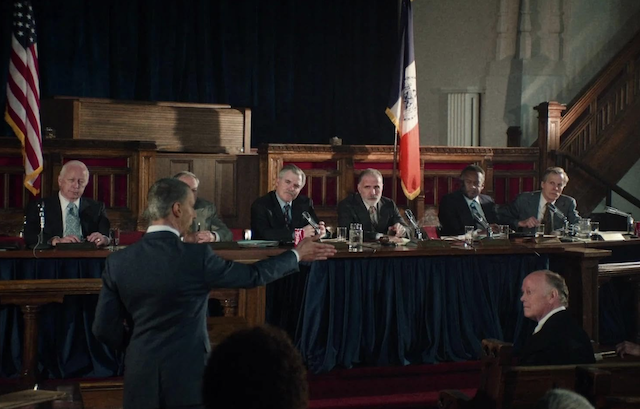
@Courtesy of Briarcliff Entertainment
Q: Is this movie essentially a Rorschach test in the sense that people see what they want to see in it?
Gabriel Sherman: Exactly. Its intention being to hold a mirror up to our society, people can look at this movie and take and see what they want to see in it. What a film can do that journalism can’t is convey emotion. Journalism is a great vehicle to convey information but cinema and art is a realm of emotion. As long as people are feeling something and seeing this film, that’s a success. When I was starting to write the movie, I read this piece in The New York Times by Ezra Klein who wrote that Trump’s secret weapon is that he lacks inhibition. He has no filter, that’s what people find so appealing about him.
Trump’s character is like: imagine how you could go through the world if you just did whatever you want and didn’t care what people think. That’s appealing to a lot of people, our politicians need to start to wonder if people feel so constricted by our culture, where they can’t say or do things without the fear of offending, if then they find relief in somebody like Donald Trump. His lack of inhibition was something that his election really brought into the front of my head.
Q : Can you talk about navigating the line between an impersonation and a performance? How did you avoid essentially falling into caricature?
Jeremy Strong: It’s a slightly inarticulable thing. There is the risk involved of doing something simply mimetic, an impersonation that’s a very surface level approach. For me, it has to begin with a tremendous and inexhaustible amount of research. Educating yourself about the person, about the milieu that they lived in, about the time. You have to absorb everything and take all that information, but you’re also looking for clues. You become an obsessive detective, looking for visceral clues for what it was like to be that person, what drives him, what is his private interior world, what is his secret pain or shame or anguish. And then you try to feel these things, inhabit them. If you’ve done your work in the right way, that will all be there in your unconscious mind and manifest itself in all kinds of ways when you’re on set making the movie. To me it’s a mysterious process.
Maria Bakalova: Jeremy spoke so beautifully about it. I’ve never done a real person before. It was a little bit scary, challenging. As Jeremy said, I prepared myself with a lot of research, I watched as many interviews as possible, looked at a lot of documentaries, read her books, it helped to try to put myself in her shoes. But to make it real, as Jeremy said, it’s about the feeling. It’s about the way to recreate the emotion and the reality of what was going on back then, instead of just trying to copy it.
Sebastian Stan: These kinds of parts are really like learning an instrument: you’re sitting there every day for a certain number of hours listening and watching. It’s slow and methodical, you’re practicing it over and over, you just get better and better to the point where you’re doing it without being aware of it.
Ali Abbasi: I want to add, and this has been interesting to watch, all these three characters for me are playing another character. In the case of Trump it’s very well documented that there is not only one character, but it’s basically one character per decade. I really feel he is being recycled constantly. It’s been really interesting to see how these guys try to hit both the private person and the character within the character.
Q: How did you get the film to look so authentically like it was being made in the 70s and 80s?
Ali Abbasi: We tried to go for reality, the banality of reality. We looked a lot at the archival footage of time, newsreels, that base level of reality was captured. I quite honestly dislike it when people tell me that the visuals were amazing, because I’m not putting the camera in a place A to B to look good. I’m putting it where I can capture the most important thing, the actors and the atmosphere. My way of working is always actors first. In this particular instance, the combination of the grittiness of that realism and the servicing of the performances, they came together.
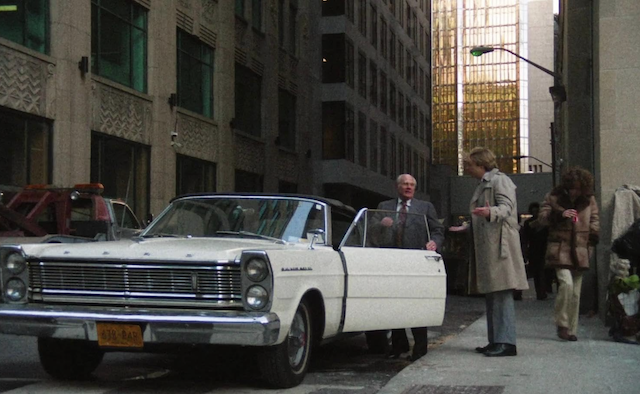
@Courtesy of Briarcliff Entertainment
Check out more of Adriano’s articles.
Here’s the trailer of The Apprentice:

